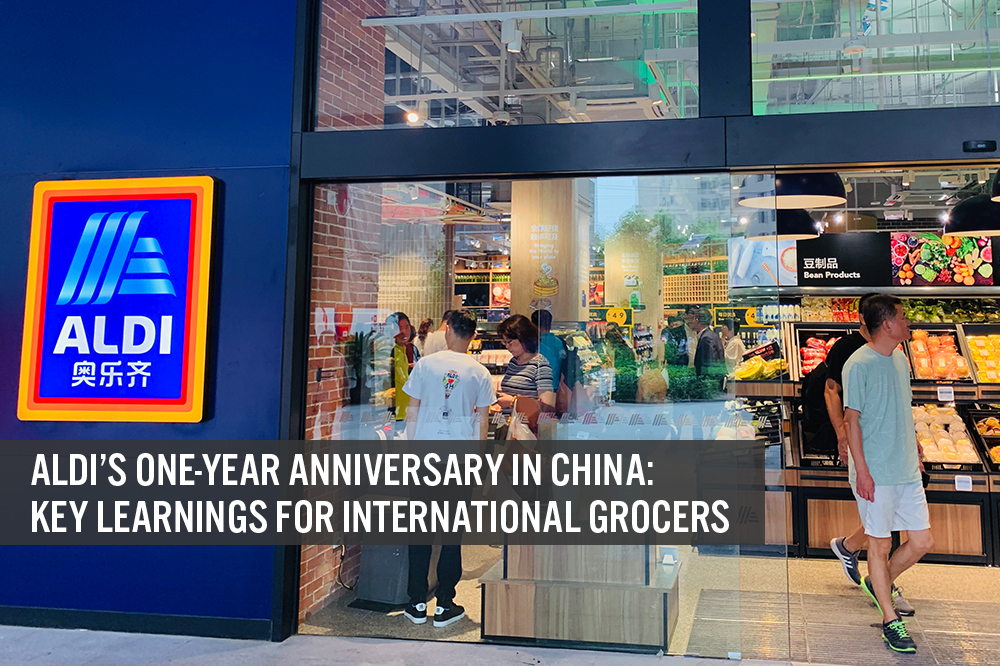
Nitheesh NH
What’s the Story
Discount supermarket company Aldi is celebrating its one-year anniversary in China, a large market in which it has proved difficult for other international retailers to operate profitably. In this report, we highlight Aldi’s multi-pronged strategy to better serve Chinese consumers and discuss the learnings that the company’s operations could offer to other foreign grocers. [caption id="attachment_111679" align="aligncenter" width="700"]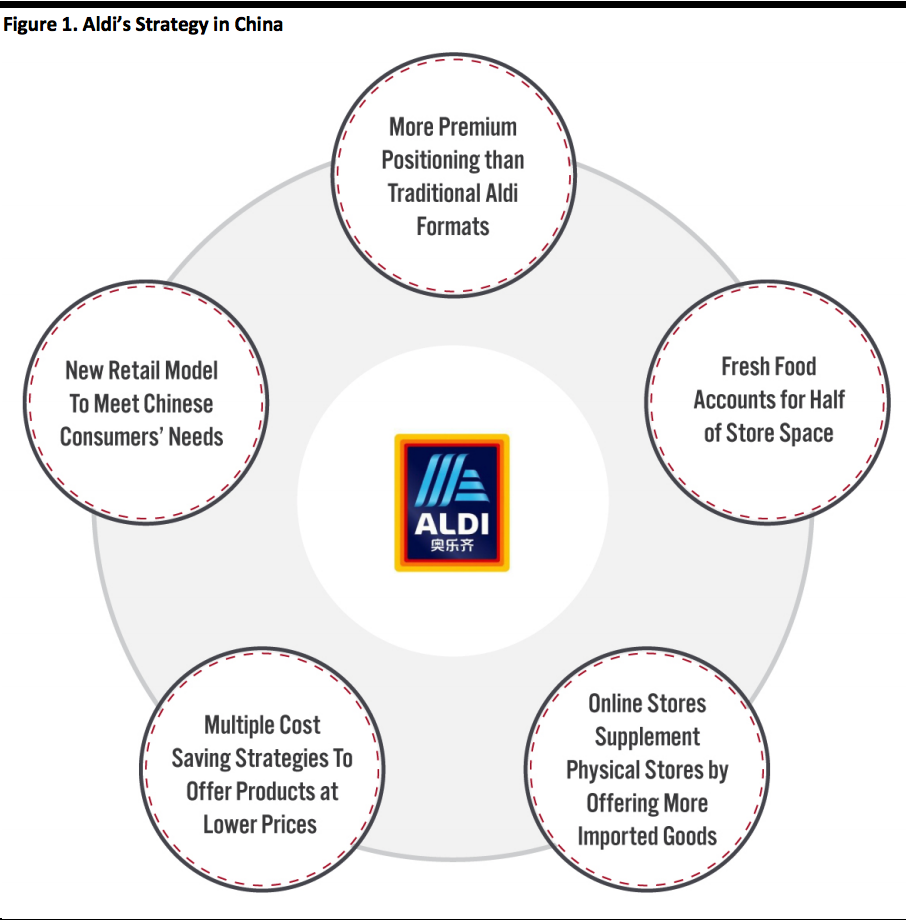 Source: Coresight Research[/caption]
Source: Coresight Research[/caption]
Why It Matters
The grocery retail sector in China is growing, presenting a lucrative opportunity for international players. The market was estimated to increase by 32.6% from 2018 to 2022, according to research firm IGD (although this estimate was made before the disruption caused by Covid-19). On the other hand, global grocery retailers in China are facing challenges due to the fast growth of online retail. French hypermarket company Carrefour, which once was one of the major players in China’s grocery retail market, saw sales fall 5.9% to $4.67 billion in 2018, and the retailer subsequently decided to sell an 80% stake in its China business—including over 200 stores—for about $700 million. However, Aldi is thriving in China. The grocery retailer opened its first two stores in Shanghai on June 7, 2019, and it now operates seven stores in the city, as of June 2020. Management at the Minhang store recently told Coresight Research that Aldi has plans to open more stores in Shanghai. Business publication Manager Magazin reported in June 2019 that Aldi plans to open 50–100 stores in China in the medium term. The Aldi we discuss in this report is Aldi Süd, one half of the Aldi empire. Aldi Nord and Aldi Süd divide Germany and international markets between them. Only Aldi Süd has expanded beyond Europe, with operations in Australia, China, the UK and the US. Aldi Süd has also been more willing than Aldi Nord to soften the hard-discount model, with bigger stores, more brands and more fresh foods; Aldi Süd’s approach appears to resonate with consumers more than hard-discount-focused Aldi Nord.Aldi’s Strategy in China: In Detail
More Premium Positioning than Traditional Aldi Formats Aldi’s stores have a more premium positioning than traditional Aldi formats to appeal to China’s rapidly growing demographic of middle-class consumers, who desire high-quality, imported products. Management consultancy firm McKinsey & Company predicts China’s middle class to reach 550 million by 2022, comprising 75% of urban households in the country. Of Aldi’s seven stores, some are located in downtown malls and others are situated near residential areas. In mid-June 2020, the Coresight Research team visited Aldi’s Minhang store, which is located in a mall surrounded by residential buildings. The store’s format features lower-level shelving, which improves shopper navigation and product visibility but which means that stock densities (e.g., per square foot) are lower. [caption id="attachment_111680" align="aligncenter" width="700"]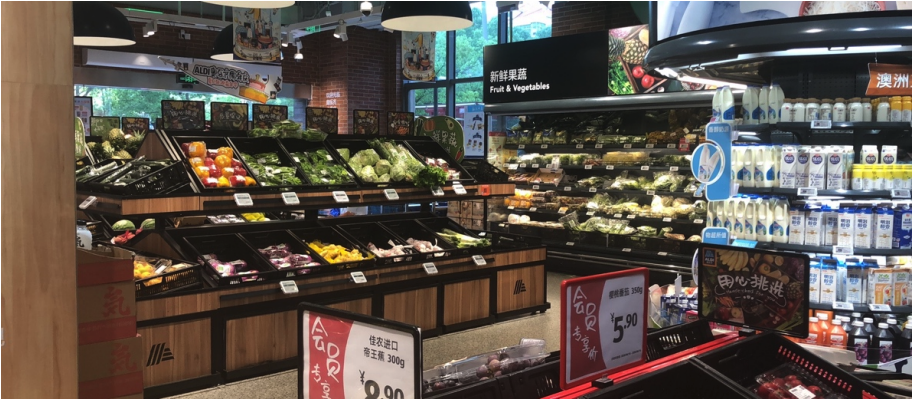 Source: Coresight Research[/caption]
Aldi’s product selection consists of around 20–30% imported goods, which many Chinese consumers consider to be of higher quality than locally sourced products. The store sells beef and fresh milk from Australia. Products imported from Germany feature, too: German products have a reputation for quality among some Chinese shoppers.
[caption id="attachment_111681" align="aligncenter" width="380"]
Source: Coresight Research[/caption]
Aldi’s product selection consists of around 20–30% imported goods, which many Chinese consumers consider to be of higher quality than locally sourced products. The store sells beef and fresh milk from Australia. Products imported from Germany feature, too: German products have a reputation for quality among some Chinese shoppers.
[caption id="attachment_111681" align="aligncenter" width="380"]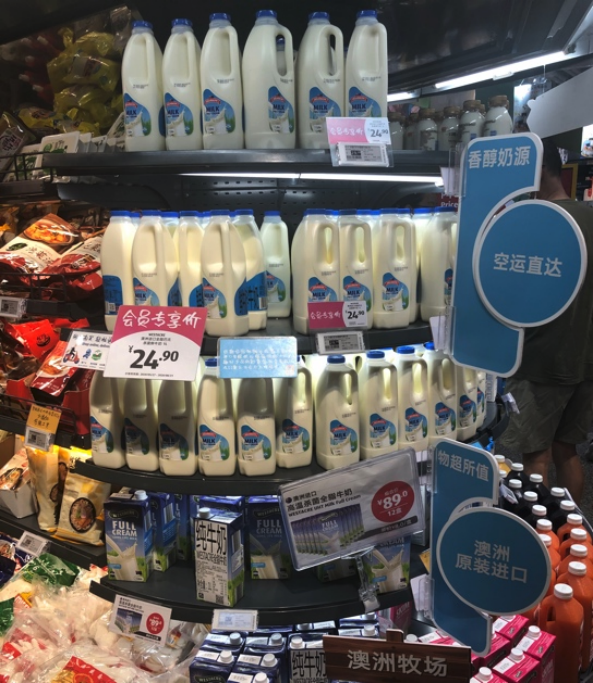 Imported milk from Australia at Aldi’s Minhang store
Imported milk from Australia at Aldi’s Minhang storeSource: Coresight Research[/caption] Multiple Cost-Saving Strategies To Offer Products at Lower Prices As elsewhere in the world, Aldi adopts a number of visible cost-saving strategies in China to enable consumers to buy quality products at lower prices—such as operating smaller-format stores and selling fewer SKUs and more private-label goods. The Minhang store is smaller than a typical Aldi store elsewhere in the world, measuring around 5,380 square feet (500 square meters)—also making it larger than a convenience store but smaller than a middle-sized supermarket in China. This enables Aldi to save on both rent and personnel costs. The Minhang store reportedly carries around 1,300 SKUs, including fresh food, frozen food, read-to-eat and ready-to-cook food, wine and spirits. The store features a “Super Saver” promotion area. There is a relatively limited variety of choices for each type of product in contrast to the abundant choice ordinarily found at a Chinese supermarket. The retailer is channeling sales through fewer SKUs, leading to higher volumes per SKU and so more favorable pricing. The Minhang store features a substantial number of private-label goods, which we estimate account for around 50% of SKUs. These products are key for Aldi to yield higher margins: Most private-label goods are made in China to cut costs, store-level management told Coresight Research. [caption id="attachment_111682" align="aligncenter" width="700"]
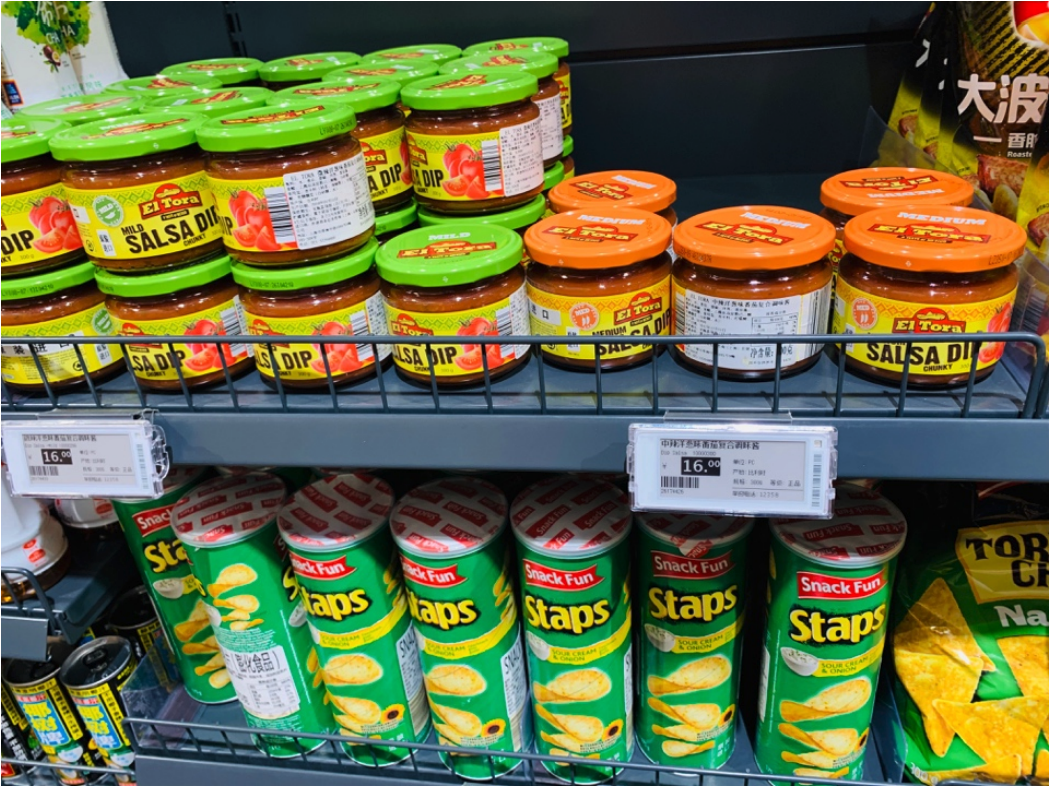 Two options for salsa dip at Aldi’s Jing’an store
Two options for salsa dip at Aldi’s Jing’an storeSource: Coresight Research[/caption] Fresh Food Accounts for Half of Store Space Aldi’s Minhang store has a substantial fresh food offering, and we estimate that around 50% of its selling space is devoted to bakery, fresh fruit, vegetables, meat and fish. The company’s focus on fresh food is in the context of the growing consumer market for fresh food in China, which is set to reach $150 billion by 2025, growing at a CAGR of 5.3% from 2016 to 2025, according to Goldstein Research. Aldi’s stores offer ready-to-eat, ready-to-cook and fresh produce categories to consumers on their way to and from work—through a focus on food-to-go in the front of each store, along with a fresh-food counter serving steamed buns, stuffed buns, sweet potatoes, German sausages and sandwiches. [caption id="attachment_111683" align="aligncenter" width="700"]
 Fresh-food counter and ready-to-eat meals at Aldi’s Jing’an store
Fresh-food counter and ready-to-eat meals at Aldi’s Jing’an storeSource: Coresight Research [/caption] New Retail Model To Meet Chinese Consumers’ Needs Aldi’s Minhang store adopts a New Retail approach similar to domestic grocery stores such as Alibaba’s Freshippo and JD.com’s 7Fresh, offering consumers convenient shopping experiences with little boundary between online and offline. It uses more in-store technology than Aldi stores in other countries, enabling consumers to shop seamlessly—for example, a welcome screen allows shoppers to access information about Aldi’s current promotions and the store. [caption id="attachment_111684" align="aligncenter" width="700"]
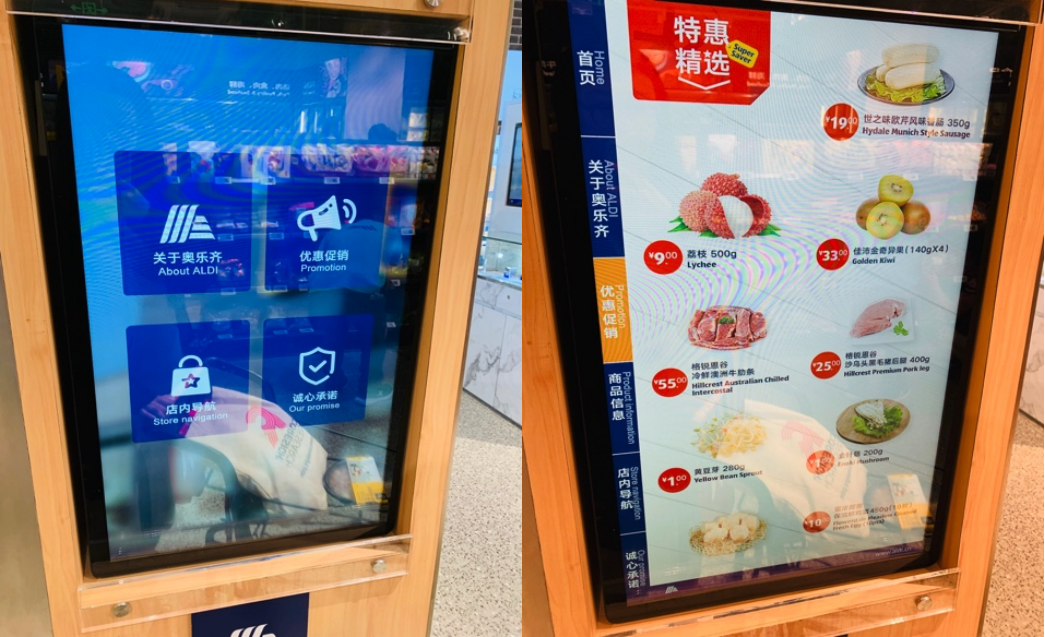 Source: Coresight Research[/caption]
Aldi’s scan-and-go WeChat mini-program is another channel that the retailer leverages to create a seamless shopping experience, by allowing shoppers to skip the checkout line using the technology. The mini-program also offers one-hour delivery services within a three-kilometer radius; customers who spend ¥49 ($6.90) per order can access free delivery services. The mini-program also automatically signs up customers for a digital membership in the Aldi Member Club, through which they can earn points by making purchases or by signing in every day; points can be redeemed for coupons to spend in store.
[caption id="attachment_111685" align="aligncenter" width="380"]
Source: Coresight Research[/caption]
Aldi’s scan-and-go WeChat mini-program is another channel that the retailer leverages to create a seamless shopping experience, by allowing shoppers to skip the checkout line using the technology. The mini-program also offers one-hour delivery services within a three-kilometer radius; customers who spend ¥49 ($6.90) per order can access free delivery services. The mini-program also automatically signs up customers for a digital membership in the Aldi Member Club, through which they can earn points by making purchases or by signing in every day; points can be redeemed for coupons to spend in store.
[caption id="attachment_111685" align="aligncenter" width="380"]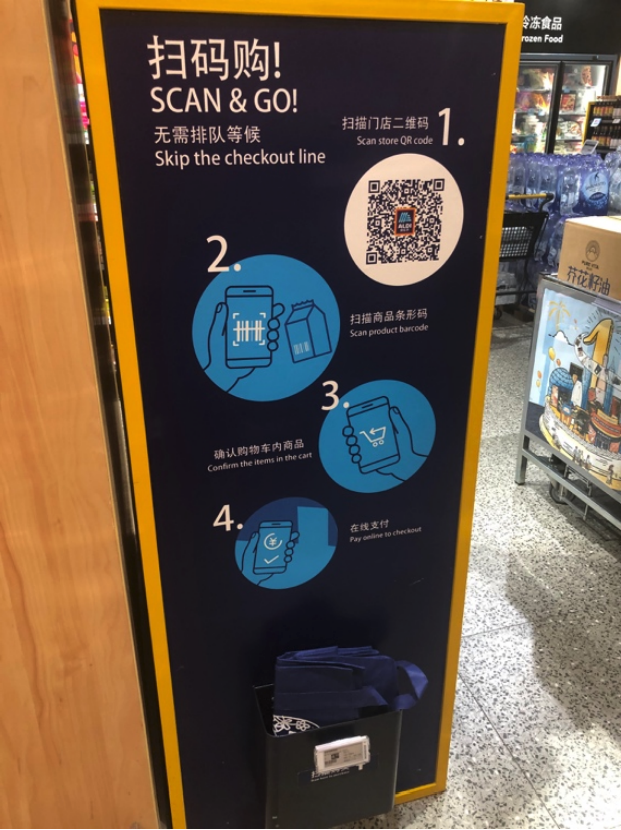 Source: Coresight Research[/caption]
Online Stores Supplement Physical Stores by Offering More Imported Goods
Aldi’s digital stores (on Tmall.com and Tmall Global) sell non-perishable groceries and wine, and the majority of these products are sourced outside China, such as Australia and Germany. Most products are displayed with a symbol displaying the country from which they are imported.
[caption id="attachment_111686" align="aligncenter" width="700"]
Source: Coresight Research[/caption]
Online Stores Supplement Physical Stores by Offering More Imported Goods
Aldi’s digital stores (on Tmall.com and Tmall Global) sell non-perishable groceries and wine, and the majority of these products are sourced outside China, such as Australia and Germany. Most products are displayed with a symbol displaying the country from which they are imported.
[caption id="attachment_111686" align="aligncenter" width="700"]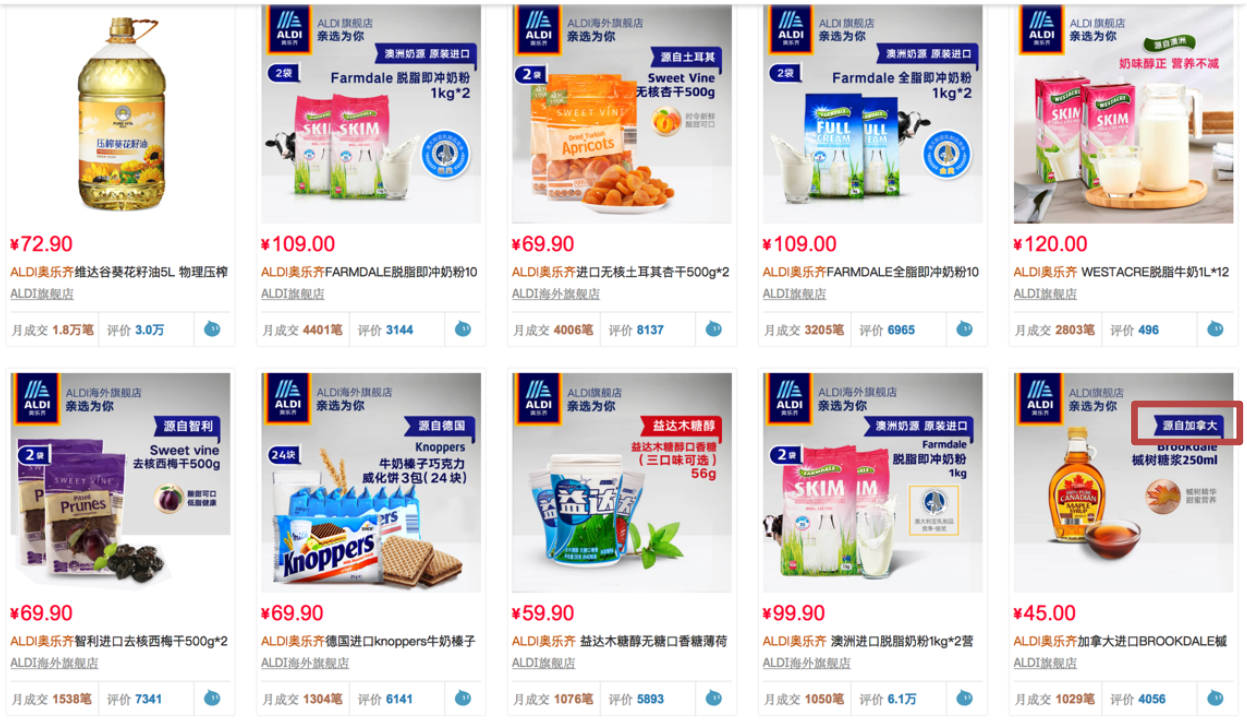 The text in the banners show each product’s country of origin
The text in the banners show each product’s country of originSource: Coresight Research[/caption] Aldi’s Tmall stores give customers the option of purchasing imported products that may be more difficult to find in its offline retail stores in China—where locally sourced goods account for 70–80% of product in order to cut costs and attract consumers. Its digital presences also enables Aldi to test new products online and assess customers’ response to them before importing them in large quantities.